March 17, 2014: Ann Arbor Council Preview
The Ann Arbor city council’s March 17, 2014 meeting features an agenda with one significant item held over from the March 3 meeting: a resolution that reserves a portion of the surface of the Library Lane underground parking structure in downtown Ann Arbor for an urban park that would remain publicly owned.
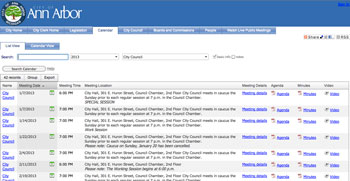
Screenshot of Legistar – the city of Ann Arbor’s online agenda management system. Image links to the March 17, 2014 meeting agenda.
But related to that item is a new resolution that directs the city administrator to move toward listing for sale the development rights for the top of the parking structure. The urban park designation was postponed from the March 3, 2014 meeting in part to sync up its timing with this resolution, which is being brought forward by Stephen Kunselman (Ward 3).
An additional related item is a resolution that would waive the attorney-client privilege on a document prepared by Dykema Gossett, the city’s outside bond counsel. The Build America Bonds used to finance construction of the Library Lane structure have private-use limitations on facilities constructed with financing from such bonds. The Dykema memo analyzes those limitations with respect to Library Lane.
That’s one of two separate resolutions on the waiver of attorney-client privilege. The other one, postponed from the council’s March 3 meeting, would waive privilege on a city attorney memo dated Feb. 25, 2014 on the topic of how appeals to property assessments work. The memo apparently helps explain “… the effect of a reduction of the assessment for one year by the Board of Review and/or the Michigan Tax Tribunal on the property tax assessment for the subsequent year.” The council’s agenda also includes an attachment of a report sent to the state tax commission, explaining how the city has complied with various deficiencies in documentation identified previously by the commission.
The council will be considering two items related to energy issues. First, the council will consider a resolution that directs the city’s energy commission and staff to convene a stakeholder work group, with the support of the city attorney’s office, to draft a commercial building energy benchmarking and disclosure ordinance. It’s an effort to help achieve goals in the city’s climate action plan.
The second energy-related item is a resolution that would direct the city administrator to hire an additional staff member for the city’s energy office, bringing the total back to two people, according to the resolution. The energy office staffer would “create and implement additional community energy efficiency, conservation, and renewable energy programs that further the Climate Action Plan’s adopted targets.”
After approving the purchase of 18 replacement vehicles on March 3 and several pieces of basic equipment at its Feb. 18 meeting, the council will be considering three resolutions that involve additional vehicles and equipment: two forklifts for the city’s materials recovery facility, a Chevrolet Impala for use by police detectives, and a lease for golf carts from Pifer Inc.
The 15th District Court, which is the responsibility of the city of Ann Arbor, is featured in two agenda items. The council will be asked to approve a $160,000 contract with the Washtenaw County sheriff’s office for weapons screening services for the 15th District Court, which is housed at the Justice Center – the police/courts building immediately adjoining city hall.
A second item related to the court is an introduction of Shryl Samborn as the new administrator of the 15th District Court. Samborn is currently deputy administrator. Current administrator Keith Zeisloft is retiring. His last day of work is March 28.
At its March 17 meeting, the council will also be asked to approve the temporary relocation of Precinct 1-7 from Pierpont Commons, 2101 Bonisteel, to Northwood Community Center (family housing). That relocation will be in effect for the May 6 vote on the transit millage and for the Aug. 5 primary elections.
Among the items attached to the March 17 agenda as reports or communications is one from the city administrator noting that for the April 5 Hash Bash event on the University of Michigan campus, all sidewalk occupancy permits and peddler’s licenses in the immediately surrounding area will be suspended. The possibility of such suspension – which the city administrator’s memo indicates is motivated by a desire to relieve congestion – is part of the terms and conditions of such licenses. They’ve been suspended for Hash Bash for at least the last six years, according to the memo.
Also among the attachments are the Ann Arbor Downtown Development Authority’s annual reports for 2004, 2005, 2006 and 2007. Those reports have been the subject of back-and-forth between Stephen Kunselman (Ward 3) and The Ann Arbor Observer over a report in The Observer’s December edition. A follow-up to an initial correction by The Observer is anticipated in the April edition – establishing that Kunselman’s contention had been correct: The DDA annual reports had not been filed with the governing body as required.
The consent agenda also includes approval of street closings for seven upcoming events: a soap box derby, SpringFest, Cinco de Mayo, Burns Park Run, Dexter-Ann Arbor Run, Washington Street Live and the Mayor’s Green Fair.
This report includes a more detailed preview of many of these agenda items. More details on other agenda items are available on the city’s online Legistar system. The meeting proceedings can be followed Monday evening live on Channel 16, streamed online by Community Television Network starting at 7 p.m.
Top of Library Lane
The council’s March 17 meeting features three items related to the future development of the surface of the Library Lane underground parking structure in downtown Ann Arbor: (1) a resolution reserving part of the surface for a publicly owned urban park; (2) a resolution that moves toward hiring a brokerage service for selling development rights to the surface; and (3) a resolution that waives attorney-client privilege on a memo from the city’s outside bond counsel.
Top of Library Lane: Urban Park
A significant item was postponed from the council’s March 3, 2014 meeting: a resolution that reserves a portion of the surface of the Library Lane parking structure in downtown Ann Arbor for an urban park that would remain publicly owned.
The proposal was also presented to the city’s park advisory commission, the week before the March 3 council meeting. For a detailed report of the PAC meeting of Feb. 25, 2014, see Chronicle coverage: “Concerns Voiced over Urban Park Proposal.”
One of the central points of friction over how to proceed is the question of who will own the space on which the publicly accessible space – a park or plaza – is placed.
The proposal put forward to PAC by Will Hathaway, of the Library Green Conservancy, and incorporated into the resolution to be considered by the council envisions a publicly-owned facility that is designated as a park in the city’s park planning documents. That would make it subject to a charter requirement on its sale – which would require a public referendum.
Councilmembers who are open to the possibility that the publicly accessible facility could be privately owned are concerned about the cost of maintenance. The city’s costs for maintaining Library Liberty Plaza – an urban park located northeast of the proposed Library Lane public park – are about $13,000 a year. That doesn’t include the amount that First Martin Corp. expends for trash removal and other upkeep of Liberty Plaza. [Urban park cost estimates]
Revisions to the resolution were undertaken since the council meeting on March 3. The now revised resolution – “version 3” in the city’s Legistar system – indicates that the area designated as a park would be 12,000 square feet, compared to 10,000 square feet in the original resolution. That square footage reflects the actual dimensions of the proposed boundaries, according to a staff memo. The revised resolution also eliminates an October 2014 deadline for making design recommendations to the council, and deletes any reference to PAC. [.pdf of revised resolution for March 17 council meeting]
The memo accompanying the revised resolution describes the changes as follows:
- Square Footage and Boundaries. The first resolved clause is modified to reflect the information we received from City staff regarding the dimensions of the area. A site plan from staff showed the accurate square footage of the area to be designated as urban park as approximately 12,000 square feet.
- Encouragement of Creative Public Programming. The second resolved clause text is now clearer that the various City government offices and the DDA are being asked to give thought to how they can encourage other groups to reserve the space on the Library Lane structure and put on creative public events.
- Integration of Park Design with Adjacent Development. The third resolved clause is an acknowledgement that the two spaces should be designed to complement each other and that the City will play a leadership role in making that integration occur.
- Activation of the Public Park through Integration with the Block. The fourth resolved clause acknowledges the necessity for the City to work with all the neighboring property owners on the Library Block in order to achieve the pedestrian connectivity that will result in vital, attractive public spaces. The text has been modified to clarify that reorientation need not entail major redevelopment.
- Process for Creation of the Public Park and Development of the Remaining Library Lane Site. The resolved clauses that spelled out specific next steps have been removed from the resolution. The assumption now is that these respective City government bodies will move forward autonomously to accomplish these tasks.
An additional point of friction involves how much of the site would be left for development if the northwest corner of the site is devoted to a public plaza/park. Related to that issue is whether the existing northern border of the site – which currently features the sides and backs of buildings – can adequately support a public plaza/park. The fact that the site does not currently enjoy other surrounding buildings that turn toward it is part of the reason advocates for a park are now asking that the Ann Arbor District Library, located to the south of the site, relocate its entrance from Fifth Avenue to the north side of its building.
In terms of the color-shaded map produced by city staff, the focus of controversy is the light orange area, which was designed to support “medium density building.” Based on staff responses to councilmember questions, the density imagined for that orange rectangle could be transferred to the planned high-density (red) portion of the site. The maximum height in the D1 zoning area is 180 feet, and the parking structure was designed to accommodate the structural load of an 18-story building.
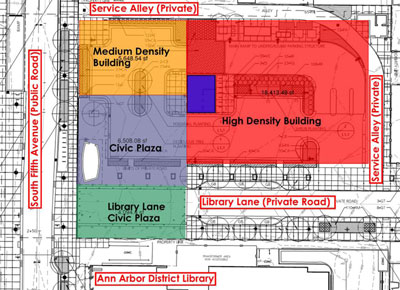
City staff diagram illustrating the building possibilities for the top of the underground Library Lane parking structure.
Top of Library Lane: Brokerage Services
Related to the urban park item is a new resolution with the title: “Resolution to Direct City Administrator to List for Sale 319 South Fifth and to Retain Real Estate Brokerage Services.” That’s the address of the Library Lane underground parking structure. As of noon Friday, the online agenda item had only a title, but no content.
The urban park designation was postponed from the March 3, 2014 meeting in part to synch up its timing with this resolution, which is being brought forward by Stephen Kunselman (Ward 3).
This approach would be similar to the path the city council took to sell the former Y lot. For that parcel, the council directed the city administrator to move toward hiring a real estate broker to test the market for development rights . The council took the initial step with that property, located on William between Fourth and Fifth avenues in downtown Ann Arbor, close to a year ago at its March 4, 2013 meeting. The council gave final approval to the sale – to hotelier Dennis Dahlmann for $5.25 million – on Nov. 28, 2013. That sale is now set to close on April 2, according to city administrator Steve Powers, who responded on March 12 to an emailed query from The Chronicle.
A rider agreement – to ensure against non-development and to sketch out the amount of open space and density – was part of the approach the city took to the former Y lot deal with Dahlmann.
Top of Library Lane: Bond Counsel
An item also related to the future development of the area above the Library Lane structure is a resolution that would waive the attorney-client privilege on a document prepared by Dykema Gossett, city’s outside bond counsel. The Build America Bonds used to finance construction of the Library Lane project have private-use limitations on facilities constructed with financing from such bonds. The Dykema memo apparently analyzes those limitations with respect to Library Lane.
In broad strokes, the American Recovery and Reinvestment Act (ARRA) of 2009 – also known as the stimulus act – created the Build America Bond program. BAB authorized state and local governments to issue taxable bonds to finance any capital expenditures for which they otherwise could issue tax-exempt governmental bonds. The bonds have a limitation related to how the facilities financed through such bonds can be used. Glossing over details, only up to 10% of a facility financed through BAB can be dedicated to private use.
All other things being equal, the Ann Arbor DDA does not contract with businesses for monthly permits. Instead, the DDA contracts with individuals on a first-come-first-serve basis.
For the Library Lane structure, the DDA offered introductory pricing of its monthly permits to encourage the structure’s initial use. And the nature of that introductory pricing scheme could prompt questions about whether some of those permits might properly count as “private use” of the structure. A $95 introductory rate (which reflects a $50 savings over most other structures) was offered to employees of “new to downtown businesses” and to permit holders in the Maynard or Liberty Square parking structures who were willing to transfer their permit to Library Lane. The pricing is good through August 2014.
Two years ago, Barracuda Networks was moving to downtown Ann Arbor, and therefore qualified as a “new to downtown” business. So its employees thus qualified for the discounted monthly parking permits.
In a July 13, 2012 email to Ward 2 councilmember Jane Lumm, DDA executive director Susan Pollay wrote in part:
I met with the two key individuals directing the Ann Arbor Barracuda office and told them point blank, that that there will be parking for Barracuda employees now when they move to downtown, and as they grow their employee ranks over the next few years.
To the extent that Barracuda employees (or employees of other downtown businesses) have privileged access or enjoy an economic advantage (like reduced rates), then it’s possible the private use test could be met for those spaces.
Four years ago, Wayne State University professor of law Noah Hall, writing on behalf of the Great Lakes Environmental Law Center (GLELC), sent the city of Ann Arbor a letter on the BAB private use issue. [For more detail, see his letter: April 14, 2010 letter from Noah Hall] GLELC was a party to a lawsuit filed over the Library Lane parking structure, which eventually was settled.
The document for which the council might vote to waive attorney-client privilege on March 17 appears to be one of the items denied in a response to a request made by The Chronicle under Michigan’s Freedom of Information Act. The item not provided to The Chronicle was a file attached to an email sent by CFO Tom Crawford on August 13, 2012 to councilmembers – named “BHO 1-# 1607254-v8-Ann_Arbor _ -_Memo_re_Permitted_Parking_Arrangements.docx” The request for that document was denied based on the statutory exemption allowed for items protected under attorney-client privilege.
However, members of the city council’s audit committee have placed a resolution on the council’s March 17 agenda to waive attorney-client privilege on the document in question. [For additional background, see: "Column: Rocking Back on the Library Lot."]
Tax Assessment
The outside bond counsel’s memo on the use of Build America Bonds is not the only item on the March 17 agenda involving the waiver of attorney-client privilege. The other one, postponed from the council’s March 3 meeting, would waive privilege on a city attorney memo dated Feb. 25, 2014 on the topic of how appeals to property assessments work.
The memo apparently helps explain “… the effect of a reduction of the assessment for one year by the Board of Review and/or the Michigan Tax Tribunal on the property tax assessment for the subsequent year.”
The memo may help explain how one section of Michigan’s General Property Tax Act is properly interpreted and applied:
211.30c Reduced amount as basis for calculating assessed value or taxable value in succeeding year; applicability of section. Sec. 30c. (1) If a taxpayer has the assessed value or taxable value reduced on his or her property as a result of a protest to the board of review under section 30, the assessor shall use that reduced amount as the basis for calculating the assessment in the immediately succeeding year. However, the taxable value of that property in a tax year immediately succeeding a transfer of ownership of that property is that property’s state equalized valuation in the year following the transfer as calculated under this section.
In Chart 1 below, a homeowner purchased the property in 2006 for $227,000. It was assessed at market value of $281,600, or $140,800 state equalized value. On appeal to the board of review in 2007, the assessed value was reduced to $113,500. In 2008, the 2007 assessed value does not appear to have been used as the basis for calculating the assessment.
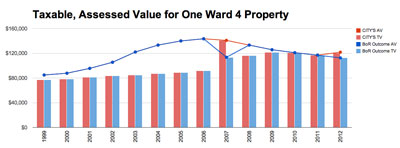
Chart 1: Taxable and assessed value for a Ward 4 property as evaluated by the city (reds) and the board of review on appeal (blues). The property changed hands in 2006. An appeal to the board of review was granted in 2007, but the city assessor appears not to have used the reduced amount in calculating the assessment in 2008.
Also related to the issue of tax assessment, the March 17 agenda includes an attachment of a report sent to the state tax commission by city assessor David Petrak, explaining how the city has complied with various deficiencies in documentation identified previously by the commission. Among the notes in the letter was an issue that’s become a routine point of public commentary for Ann Arbor resident Ed Vielmetti – the timely filing of meeting minutes by various boards and commissions. From Petrak’s report to the tax commission:
Concern #2: Board of Review prepared minutes were not filed with the local unit clerk
Response: On February 18th 2014 the Board of Review minutes were officially filed with and recorded by The City Clerk. Staff will insure all future minutes are similarly recorded in a timely fashion.
Energy
The council will be considering two items related to energy issues: (1) a resolution directing the drafting of an ordinance; and (2) a resolution calling for a staff position to be filled.
Energy: Resolution on Development of Energy Disclosure for Commercial Buildings
The council will consider a resolution that directs the city’s energy commission and staff to convene a stakeholder work group, with the support of the city attorney’s office, to draft a commercial building energy benchmarking and disclosure ordinance. Such an ordinance would require owners of commercial buildings to disclose data on energy consumption by their buildings. It’s an effort to help achieve goals in the city’s climate action plan, which was approved by the city council at its Dec. 17, 2012 meeting. Ann Arbor’s climate action plan calls for a reduction in greenhouse gas emissions of 8% by 2015, 25% by 2025, and 90% by 2050. Baseline for the reductions are 2000 levels.
The resolution on the council’s March 17 agenda originated with the city’s energy commission. The staff memo compares the idea of a disclosure requirement for energy usage by commercial buildings to a miles-per-gallon rating for vehicles or nutritional facts labeling for food products. According to the memo, awareness of energy consumption has been shown to encourage building owners to have energy audits done on their buildings. Those audits can then lead to energy efficiency upgrades that result in cost savings to the building owners and reduced emissions.
An estimate for the potential energy cost savings that would result from an energy benchmarking ordinance in Ann Arbor – prepared by the Institute for Market Transformation (IMT) – is between $2 million and $2.5 million, annually. According to the staff memo, similar ordinances in place in other cities typically employed a phased approach, often with municipal buildings as well as the largest private buildings (by square footage) complying in the initial year(s), and medium-sized and/or smaller buildings participating in later years.
The energy commission is recommending that an ordinance be developed with a phased approach, with the phases based on building categories and sizes. One possibility is to start with all qualifying municipal buildings in the first six months, commercial buildings over 100,000 square feet in 12 to 18 months, multifamily and commercial buildings over 50,000 square feet in 24 to 36 months, and all commercial buildings over 10,000 square feet in 36 to 48 months. The goal would be to have reported energy consumption information for 80% of the commercial square feet in the city within five years of adoption.
Energy: Resolution on Energy Office Staff
The second energy-related item on the March 17 city council agenda is a resolution that would direct the city administrator to hire an additional staff member for the city’s energy office, bringing the total back to two people, according to the resolution.
The energy office staffer would “create and implement additional community energy efficiency, conservation, and renewable energy programs that further the Climate Action Plan’s adopted targets.” Among the specific efforts cited in the resolution are the city’s property assessed clean energy (PACE) program.
At its March 4, 2014 meeting, the city’s planning commission passed a resolution in support of the hiring. Planning commissioners were briefed on the issue by Wayne Appleyard, chair of the energy commission. Resolutions of support were also passed by the city’s energy and environmental commissions.
Wheels
After approving the purchase of 18 replacement vehicles on March 3 and several pieces of basic equipment at its Feb. 18 meeting, the council will be considering three resolutions that involve additional vehicles and equipment: two forklifts for the city’s materials recovery facility, a Chevrolet Impala for use by police detectives, and a lease for golf carts from Pifer Inc.
Wheels: Forklifts
The council will be asked to approve the purchase of two Clark C30 forklifts for use at the city’s materials recovery facility (MRF) for a total of $55,268.
The forklifts to be purchased would replace two that are currently being rented at a cost of $12,000 a year. The city is calculating that the purchase cost will be covered by savings in rental costs in 2.3 years.
Wheels: Detective
On the council’s March 17 agenda is the approval of the purchase of a police detective vehicle – a Chevrolet Impala – from Berger Chevrolet in Oakland County for $26,750. The car will replace a vehicle that in the next year will have reached an 80,000-mile limit specified in the city’s labor contract.
Wheels: Golf Carts
The council will be asked to approve an amendment to a two-year golf cart lease with Pifer Inc. The agreement would increase the original number of 65 leased carts by 34 carts, for a total of 99 carts. The city leases golf carts from Pifer for the Huron Hills and Leslie Park golf courses.
The lease amendment would be for two years, for an amount not to exceed $50,340 over the length of the lease amendment term. Funding for FY 2014 would come from the parks and recreation services general fund and would be in the proposed budget for FY 2015, according to a staff memo. In FY 2013, the city generated about $225,000 in revenue from golf cart rentals.
The council’s resolution also will approve the sale of 32 city-owned golf carts to Pifer for $50,340. The city’s park advisory commission recommended the action on golf carts at its Feb. 25, 2014 meeting.
15th District Court
The 15th District Court, which is the responsibility of the city of Ann Arbor, is featured in two agenda items.
The council will be asked to approve a $160,000 contract with the Washtenaw County sheriff’s office for weapons screening services for the 15th District Court, which is housed at the Justice Center – the police/courts facility immediately adjoining the Larcom city hall building at the corner of Huron and Fifth.
The total amount of the contract reflects an amount of $26.24 per hour per court security officer. According to the staff memo accompanying the resolution, it’s estimated that three officers would be assigned on a given day with hours staggered to match the ebb and flow of court business through a typical day.
A second item related to the 15th District Court is an introduction of Shryl Samborn as the new administrator. Samborn is currently deputy administrator. Current administrator Keith Zeisloft is retiring. His last day of work for the court is March 28.
Election Polling Places
At its March 17 meeting, the council will also be asked to approve the temporary relocation of Precinct 1-7 from Pierpont Commons, 2101 Bonisteel, to Northwood Community Center (family housing), which is the location for Precinct 2-1. That relocation will be in effect for the May 6 vote on the transit millage and for the Aug. 5 primary elections.
The relocation is needed because Pierpont Commons will be unavailable due to renovations being undertaken by the University of Michigan to that facility.
The council’s resolution is needed only on the relocation for Aug. 5 – when the two precincts will operate separately but at the same Northwood Community Center location. The city election commission has the authority to consolidate the two locations – which it did for the May 6 election at its Feb. 26 meeting.
Attachments
The online agenda for March 17 includes myriad reports and communications as attachments.
Attachments: Hash Bash
Among the items attached to the agenda as reports or communications is one from the city administrator noting that for the April 5, 2014 Hash Bash event on the University of Michigan campus, all the sidewalk occupancy permits and peddler’s licenses in the immediately surrounding area will be suspended.
The possibility of such suspension – which the city administrator’s memo indicates is motivated by a desire to relieve congestion – is part of the terms and conditions of such licenses. They’ve been suspended for Hash Bash for at least the last six years, according to the memo. Hash Bash is a gathering that focuses on reform of marijuana laws.
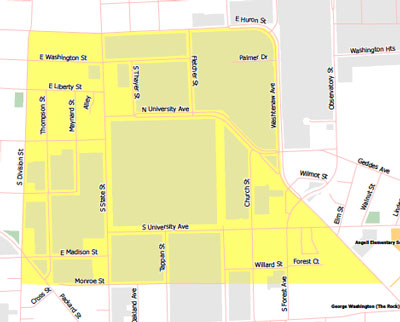
Map of area where peddler and sidewalk occupancy permits have been suspended for the April 5, 2014 Hash Bash.
Attachments: DDA Annual Reports
Also among the attachments are the Ann Arbor Downtown Development Authority’s annual reports for 2004, 2005, 2006 and 2007. Those reports have been the subject of back-and-forth between Stephen Kunselman (Ward 3) and The Ann Arbor Observer over a report in The Observer’s December edition. A follow-up to an initial correction by The Observer is anticipated in the April edition – establishing that Kunselman’s contention had been correct: Before 2011, the reports had not been filed with the governing body as required under state statute.
Street Closings
The March 17 agenda features a number of street closings for upcoming events. They appear on the consent agenda, which includes a group of items voted on “all in one go.” So unless a councilmember pulls out a consent agenda item for separate consideration, these items won’t be mentioned explicitly at the meeting.
- Saturday, March 29, 2014: Sixth Annual Box Cart Race/Soap Box Derby. The event is sponsored by Phi Delta Theta Fraternity and Ann Arbor Active Against ALS to honor the legacy of their fraternity brother, Lou Gehrig, and to raise money for ALS research. All proceeds from the event will be donated to ALS research. Streets to be closed: South University from Oxford to Walnut; Linden from South University to Geddes.
- Thursday, April 10, 2014: SpringFest. The sponsor, the University of Michigan-MUSIC Matters organization, is presenting a day of festivities to be capped off with a MUSIC Matters concert. The festivities will feature an assortment of student groups from the innovation, arts, sustainability, music and social justice communities on campus. Speakers will begin the program at 1 p.m. with live music featuring students and other local Ann Arbor talent to begin at 2:30 p.m. Streets to be closed: North University Street between Thayer and Fletcher Streets.
- Sunday, May 4, 2014: Burns Park Run. Streets to be closed: Several streets in the Burns Park neighborhood.
- Tuesday, May 6, 2014: Ann Arbor Cinco de Mayo Party. The event is sponsored by Tios Restaurant to celebrate Cinco de Mayo. Streets to be closed: Liberty Street between Thompson and Division.
- Saturday, June 1, 2014: Live on Washington. This is a youth-curated outdoor arts festival, featuring performances on a stage as well as more “interactive street art” like break dancing, puppetry, and mural art. It’s sponsored by the Neutral Zone. Streets to be closed: Washington Street between Fifth Avenue and Division.
- Sunday, June 1, 2014: Dexter-Ann Arbor Run. The Dexter-Ann Arbor race is sponsored by the Ann Arbor Track Club. Streets to be closed: Several downtown streets and surface parking lots.
- Friday, June 14, 2013: Mayor’s Green Fair.
The Chronicle could not survive without regular voluntary subscriptions to support our coverage of public bodies like the Ann Arbor city council. We sit on the hard bench so that you don’t have to. Click this link for details: Subscribe to The Chronicle. And if you’re already supporting us, please encourage your friends, neighbors and colleagues to help support The Chronicle, too!




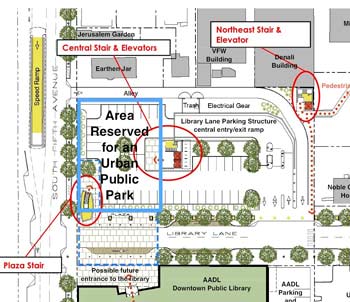
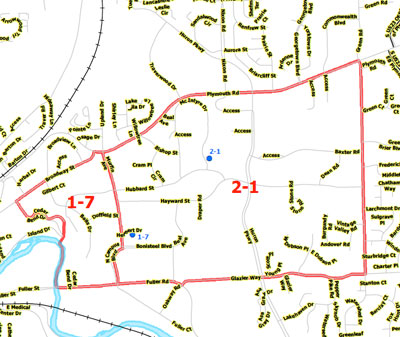
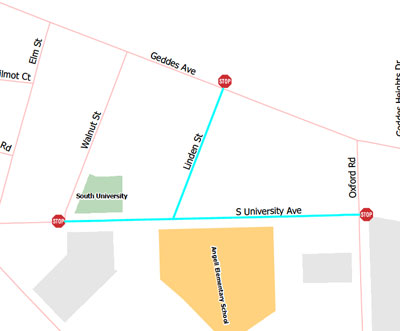
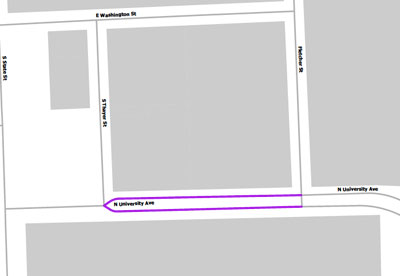
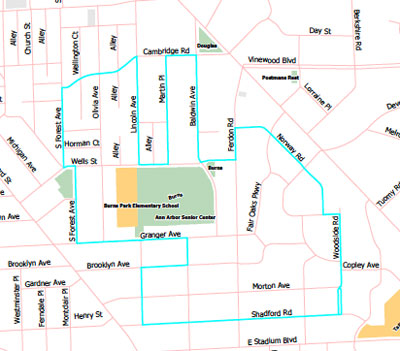
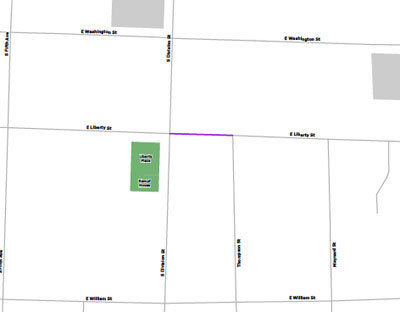
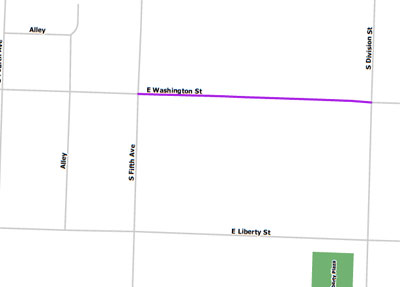
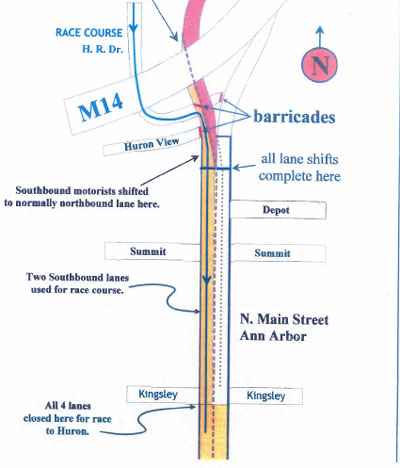

“The city’s costs for maintaining LIBRARY Plaza – an urban park located northeast of the proposed Library Lane public park – are about $13,000 a year.”
Did you mean Liberty Plaza?
Yes, of course – it’s Liberty Plaza, as stated later in that paragraph. Thanks for spotting that, and I’ve made the correction.
I have to say that it’s pretty cool to see the “close the street” events! Makes me remember that spring/summer will be there!
One thing though…is the Tios Cinco de Mayo closing really on the 6th? Because the actual holiday of course is on the 5th. Either way, it will be a fun time :)
Related to the council’s agenda item about hiring a brokerage service to sell development rights to the Library Lane surface, the Ann Arbor planning commission agenda for March 18 now includes a resolution giving advice to the council about how to handle that sale. The two resolved clauses are:
The resolution is being brought forward by planning commissioners Diane Giannola and Bonnie Bona. It’s similar in intent to the recommendation that the commission gave to council regarding the sale of the former Y lot.
The planning commission’s March 18 agenda includes another item titled: “Resolution Regarding Edwards Brothers Property.” However, no additional information is included yet for that item.
Update: The resolution on Edwards Brothers has been added: [link]
Re: #3. Although I don’t know, I would bet that the reason Cinco de Mayo (5th of May) is being celebrated on May **6** is because both the Hash Bash and the Monroe Street Fair are on the 5th.
It’s good to be able to move a little through downtown . . .
Ignore that. I’ve mixed up April and May.
Maybe if the weather were warmer . . .
@6 My bet is that you are not the only one in town who’s focus has been affected by this long, cold, lonely winter. :-)